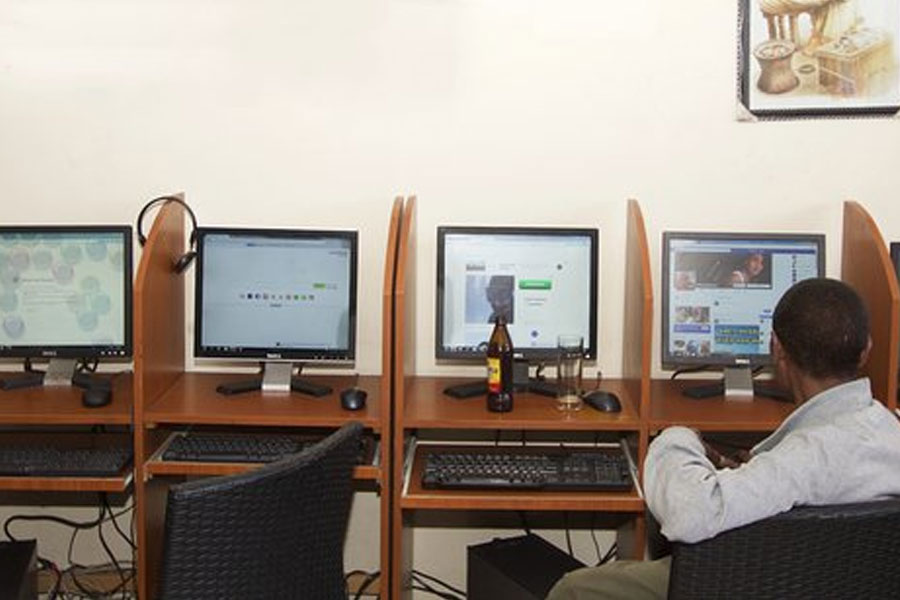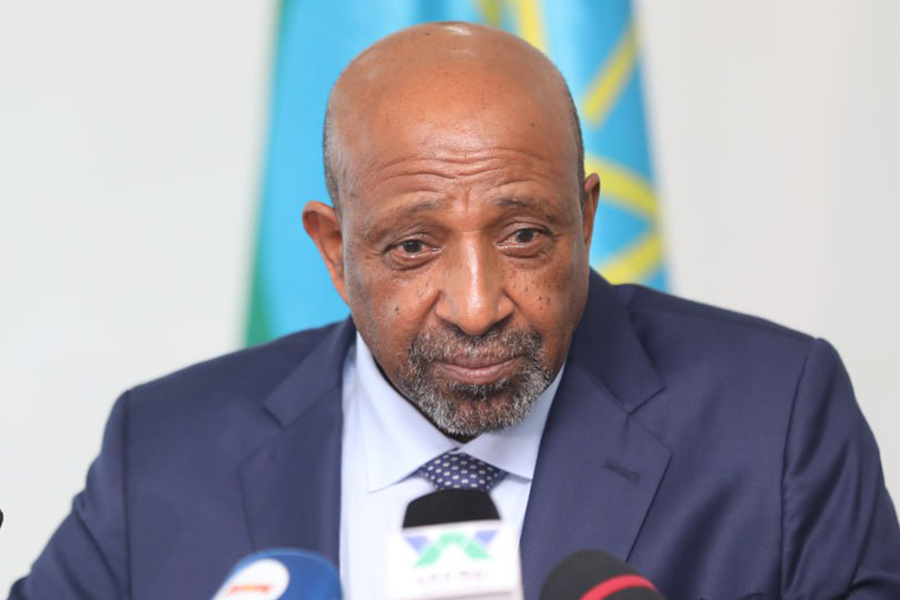
Radar | Oct 07,2023
On the ground floor of Addis Abeba Institute of Technology (AAiT) hall, a quiet examination room awaited senior-year students tentatively making their way to take the model exit exam.
The bright room had 12 computers, with three administrators keeping a watchful eye on the students. As soon as students log into their accounts, the timer begins counting down from 150 minutes.
A 23-year-old Yasub Getu from the Electrical & Computer Engineering department is one of the 400 examinees that took the model exam in the institution.
Yasub made an effort to complete 90 questions within two and a half hours. However, halfway through, a power outage occurred, which caused her momentary apprehension as the generator took some time to restore power.
Although the system had saved the locked answers, the timer had not paused.
"That was very unsettling," said Yasub.
Being part of the first generation of examinees, the experience felt strange to the aspiring engineer.
Some questions that were expected based on the schedule had not exactly been present in the model examination, leading to confusion about what to expect in the real exam. Despite believing that taking the exam would create a fairground in the labour market, the sudden imposition felt spontaneous, creating trepidations of inadequate preparation.
"We should have known from the beginning," she said.
Nearly 168,000 students have completed the mock exams, which are designed to help them prepare for the upcoming real exams this week. It is anticipated that around 195,000 students will sit for the official exams in 47 public universities across the country, spanning five consecutive days.
Under Berhanu Nega (Prof), the Ministry of Education has introduced a sudden and strict requirement where students on the last straw of their undergraduate studies will take an exit examination to qualify for a degree. Officials expect it will measure the skill, knowledge, and aptitude of graduating students.
Eba Mijena (PhD), head of higher education Academic Affairs at the Ministry, said the exam is a prerequisite to getting a degree. He disclosed that students who fail to obtain a passing mark will be allowed to try again after six months.
Over 200 examination facilities with computers had been prepared by the Ministry.
“Although not state of the art, they are equipped with the necessary infrastructure,” said Eba.
The oldest higher education facility in the country, Addis Abeba University, is administering the exit exam to 15,300 students. The majority of the examinees are from private universities and colleges, accounting for 80pc of the total number. The University offers 84 undergraduate programs across 50 departments.
Wubayehu Mamo, an advisor to the University's president Tasew Woldehanna (PhD), disclosed the 23 examination halls equipped with 2,600 computers along with a newly formed task force comprising administrative and academic leaders with model exams and tutorials on the ready.
Ministry officials hope the much-anticipated exit exam will help revive the declining quality of education, serving as a stepping stone towards restoring faith in the education system.
Seid Mohammed, head of quality & competency enhancement at the Ministry, believes quality, competition, and transparency will be attained through the exit exams.
He said that it will bring about accountability and transparency not only for students but also for instructors and higher education institutions, who will be measured for their success or failure, based on their students' performance.
"This will serve as a wake-up call for educators," he said.
Many of the 324 private colleges in the country have been frequently reprimanded by the federal agency responsible for not maintaining higher education standards.
Although the overall declining quality of education is rarely debated, Geremew Zerfu, academic development & quality assurance officer at Alpha University College, argues that simply conducting mere examinations will not be enough to restore it. He asserts that the necessary groundwork must be established.
Alpha University College, established in 1981, is one of the better-known higher education institutions in the country, hoping to graduate 863 students this year.
Geremew argued that reforms should begin with competent teachers and equipped facilities.
"Proper groundwork is missing from the reforms," he told Fortune.
According to the Online Journal of New Horizons in Education, surplus students entering universities with a low level of academic preparation and a weak mastery of basic knowledge have led to poor graduate quality. The total enrollment rate of students had increased from 42,132 in 1996, to 192,000 in 2004, quadrupling in less than a decade.
An average of 160,000 students across the country graduate annually. Although officials have been trying to accommodate the surging number of students by expanding to 47 public universities, researchers argue that quantity has outweighed quality.
Poor university and industry linkage, low wages, lack of facilities and educational resources, and the mismatch between competency and the labour market are some of the challenges for novice graduates.
The transition from school to the labour market has been challenging for graduates who are venturing into the professional world with hopes of immediate employment.
According to a survey conducted by Policy Studies Institute, the average labour market transition of graduates is an average of 12 months.
It indicates that the location of a graduate's residence and the type of educational institution they attended significantly impact on their ability to transition into the job market. The study reveals that graduates who pursued fields of study they were passionate about and hail from regions with low to no conflict have a higher chance at quick employment.
Kenean Wolde, 24, was a second-year biotechnology student at Aksum University who has found herself at the mercy of war and the Covid pandemic. The reaction to the pandemic meant that she had to stay for a semester at home.
When students were called back in, she, along with five of her classmates, decided to defer the semester due to the looming conflict.
As anticipated, the war between the Tigray People Liberation Front (TPLF) and the federal government broke out before the semester ended, forcing the closure of the university. Students from Meqelle, Adigrat, and Aksum universities were transferred to universities across the country with relative peace.
Kenan found herself at Wachemo University in South Nations Nationalities and Peoples regional state, where she learned of the exit examinations. She feels unsettled about the future following an educational stint marked by constant interruptions, an unfamiliar environment and war-induced psychological trauma.
"The teachers did not prepare us,", she told Fortune in reference to her past two years at Wachemo.
Some teachers concede that the exams were a sudden imposition on the students, while others believe it was the relaxed attitude that got the better of them.
Over 420Km north of the capital, 3,592 students from public universities and 7,408 students from private universities are expected to take the exam at Gonder University. Instructors have been giving tutorials and model tests to students for the past eight months.
Bisrat Worku, one of the eight committee members in the social science and humanities college at the Univesity, has observed that the students did not take the examinations seriously at first. The population studies instructor noted that the majority of students had scored much below average during the first model exams, primarily due to a lack of preparation.
"They genuinely questioned the reality of the examination at first," he told Fortune.
In the first model exam, students scored an average result of 52.2pc, all the while internet and power outages disrupted the test-taking process.
"We had asked for a standby generator," Bisrat said.
He also said that the students are disposed to psychological anxieties when taking the tests, subjecting them to perform sub-optimally.
Gonder University had not been spared from temporary closure during the war, with the university having to add a semester to make up for six months of lost time.
While Bisrat recognizes the utility of examination in raising the quality of education, he questions whether the timing is quite right.
"Universities just began to recover from the war," he said.
Experts who study human resource development note the importance of evolving education policies, institutional infrastructures and improved staff competence.
Desalegn Anshiso (PhD), a human development & labour market coordinator at the Policy Studies Institute, said in a country where nearly 70pc of the population is estimated to be under the age of 30, reforming the higher education sector is mandatory. He echoes the sentiment of Bisrat with regard to the timing of the examinations due to Covid and the war, while strongly advocating for a comprehensive reform to higher education in the country.
The researcher believes that the youth have been deprived of opportunities to acquire the skills and knowledge necessary for a successful career, leaving them trapped in a cycle of poverty and unemployment.
"We need to shift from crisis response to preemptive planning in educational policy," he told Fortune.
He considers the examination to be a step forward in delivering quality education. While recognizing the unique circumstances of the country, he finds waiting for an ideal moment for educational reform "completely unacceptable".
"Education is of the utmost priority," he said.
Desalegn suggests establishing and properly implementing strategic policies at a national and regional level to create a manageable bridge from life as a university student to the labour market.
He recommends structuring effective competency-based curriculums that enhance university-industry linkages.
According to Desalegn, policymakers need to ensure that educational reform is properly implemented on academic leaders. He recalled qualification exams administered to University teachers in which more than half failed to obtain passing results.
PUBLISHED ON
Jul 08,2023 [ VOL
24 , NO
1210]

Radar | Oct 07,2023

Fortune News | Jul 30,2022

Viewpoints | Sep 28,2024

Fortune News | Mar 26,2022

Fortune News | Jun 07,2020

Radar | Aug 16,2020

Editorial | Apr 13, 2025

Radar | Jan 01,2022

Viewpoints | Apr 13,2024

Radar | Sep 14,2024

Dec 22 , 2024 . By TIZITA SHEWAFERAW
Charged with transforming colossal state-owned enterprises into modern and competitiv...

Aug 18 , 2024 . By AKSAH ITALO
Although predictable Yonas Zerihun's job in the ride-hailing service is not immune to...

Jul 28 , 2024 . By TIZITA SHEWAFERAW
Unhabitual, perhaps too many, Samuel Gebreyohannes, 38, used to occasionally enjoy a couple of beers at breakfast. However, he recently swit...

Jul 13 , 2024 . By AKSAH ITALO
Investors who rely on tractors, trucks, and field vehicles for commuting, transporting commodities, and f...

Oct 25 , 2025
The regulatory machinery is on overdrive. In only two years, no fewer than 35 new pro...

Oct 18 , 2025
The political establishment, notably the ruling party and its top brass, has become p...

Oct 11 , 2025
Ladislas Farago, a roving Associated Press (AP) correspondent, arrived in Ethiopia in...

Oct 4 , 2025
Eyob Tekalegn (PhD) had been in the Governor's chair for only weeks when, on Septembe...